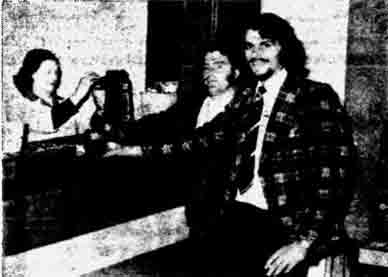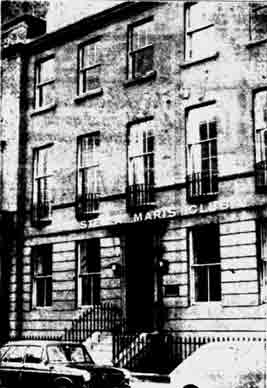Stella Maris Club.
69 Carlton Place, Glasgow.
In the News 1974...
Glasgow's Stella Maris Club is ...

James MacPhee (left) and his sailor brother Donald at the bar. Donald has been in Stella Maris Clubs all over the world.
Behind the elegant terraced facade of 69 Carlton Place, on Glasgow's revamped riverside, is a polkglot home, from, home known from Finland to Patagonia.
If you find yourself walking behind a swarthy Chilean, German, Moroccan, Greek or Argentinian sailor next Sunday night, the chances are he's heading for the Stella Maris Club's weekend dance for seafarers.
The sailors could of course be Indian, Norwegian, Italian, Iranian, Filipino, Dutch, Nigerian, Spanish, Danish or Portuguese because all these nationalities are listed in the discreet visitors' book which lies behind the club's ever-open door.
The Stella Maris Club welcomes seamen from all over the world, and admits them free of charge to its five-storey building just across the suspension bridge from Clyde Street.

A blether
It is open every evening and offers a bar- lounge, a colour TV lounge, a bingo and dance hall and a games room. It not only has a chapel, the building is owned and run by the Roman Catholic Archdiocese of Glasgow, but is also the Scottish headquarters of a remarkable organisation which started in Glasgow in 1920 and is now a huge international movement.
Father Frank Mallon, a 50 year old ex-sailor who saw service with the Royal Navy as a telegraphist during the last war, has a flat in the building and as office decorated with pennants from every continent.
The description home-from-home isn't chosen lightly. he said, "Seamen like to talk about their families. Many of them are at sea only because they can't make enough money to support their families any other way, and they like to sit and have a blether about home, especially with someone who knows what it's like to be at sea.
"The talk here is mainly about those two topics, home and the sea. Some of the men bring their problems to me, mainly marriage troubles, and I do what I can to help, but primarily we are here to show some concern for men who are far from home." That was how the whole movement, which is called the Apostleship of the sea, began.
People living in dockside areas like Govan and Anderston began a gathering to cater for seamen visiting the city, and opened headquarters in a converted shop not far from Anderston Cross. Gradually the project spread to all the dockside parishes right down to Dalmuir and Clydebank. The idea caught on and similar groups were formed by people in Liverpool, and then in London. Now there are 70 Apostleships of the sea clubs in 28 different countries.
The clubs are staffed by volunteers who are members of the Apostleship of the sea society, they pay £1 a year for membership, but the seamen pay nothing.
A Dance
Father Mallon, who smokes, appropriately, Senior Service, says Mass in the Club's upstairs chapel each Sunday evening. "This is for those seamen who are Catholics," he said, "But most of those who come here aren't, and our Sundays are always busy because as well as having our weekly dance, that's the night we play bingo for prizes.
"During the bread shortage a few months age, a Dutchman won two loaves. He didn't know why everyone was clapping and cheering and he handed them to a woman member who was sitting next to him, and she was so pleased she nearly kissed him."
One of the club's biggest attractions is the fact that the seamen can phone home from the Chaplain's office. "We have to charge them for the calls, of course," said Father Mallon, "But it makes a lot of difference to a man if he can call his family at home from a comfortable place where he doesn't have to keep popping ten pence pieces in the slot all the time."
The volunteers also visit seamen who may be in hospital, "Or even in Jail," smiled Father Mallon. "There are times when sailors will be sailors, and it's good for a man to know he's going to be visited, or has some one to help him get as much help as he needs."
End.
